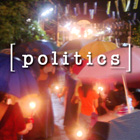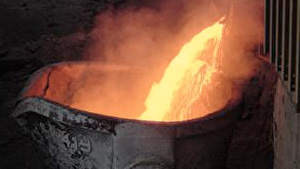
|
CHIEF OF CHILE'S SPECIAL FORCES WAS RELIEVED OF DUTY AFTER AGENTS ASSAULTED STUDENTS, PRESS 2 June 2006 Michelle Bachelet's government has tried to bridge the divide between seizing a unique opportunity to increase spending due to the copper boom and demonstrating the fiscal responsibility she has promised will allow her government to build long-term reforms into Chilean social policy. But her $130 million spending plan does not include a major education-spending increase. High school students have been organizing to call for nationwide increases, saying only with better education is an egalitarian democracy truly possible. Last week, the large student strike in Santiago swelled and gained support, without producing a promise from Bachelet to direct major new funding toward public education. So students announced the beginning of a national student strike, calling on others from around the country to demonstrate with them. When the protests in Santiago on Monday began to grow, showing the added force of a national movement, students were reported to have chanted "Where is Bachelet?" outside the nation's presidential palace. Her government responded by sending the under-secretary for education to hear student complaints; she herself complained the students needed a unified leadership in order to negotiate. On 30 May, some 600,000 high school students around the country walked out, marching in peaceful street protests, calling for systematic reform in Chilean education. They want higher central standards and more uniform administration of the system, while allowing more input from local communities as to their needs in education policy and funding, to combat inequities in the national system, stemming from huge disparities in local or regional funding. In the capital, Santiago, large peaceful street protests elicited a violent crackdown from security forces. Chile's national police, the Carabineros, and Special Forces riot units used water cannon, teargas and batons to break up the demonstrations, alleging that masked protesters had thrown rocks at police. In all, some 730 demonstrators were arrested. At least 4 reporters were attacked by police, some shown on national television being violently beaten. According to Human Rights Watch, "Libio Saavedra, a television cameraman, told reporters that he was assaulted by more than 20 Special Force officers who threw him to the ground and kicked him repeatedly." Saavedra also said his attackers did not appear to be wearing the name tags they are required to wear, to be identifiable if abuses occur. Three female students said they had been sexually assaulted by police after being detained in the neighborhood of Puente Alto. Pres. Bachelet has said the violent assault on protesters was "outrageous, unjustified", has called for thorough investigation of the crackdown and the police policies leading to the violence. She has also promised the serious allegations of aggravated assault and sexual assault will be investigated and potentially prosecuted as crimes. A deputy commander of the Special Forces was also dismissed and 8 agents were suspended, pending investigation into their roles in the clashes. José Miguel Vivanco, Americas director for Human Rights Watch, has said "Excessive force by Carabineros in controlling street demonstrations is still disturbingly common in Chile", and the organization is calling for a systematic review of the nation's security procedures, to ensure that demonstrators have the right to protest peacefully. Press reports indicate student leaders say the "masked men" were "infiltrators", possibly there to disrupt the protests, provoke police, but not linked to their movement. There is no clear evidence at the moment as to whom the masked infiltrators may represent, though the allegation harkens back to an anti-globalization rally in Barcelona, in 2001, when undercover police used rocks to spark disturbances and justify retaliation. Last night, as protests continued, Pres. Bachelet, announced the state would provide free transport for poor students, to ensure their ability to attend classes. She also announced that starting in 2006, 155,000 students will have free access to university entrance exams, and 500,000 new free lunches will be provided to schools in need over the next two years. She also announced the creation of a new national Superintendant of Education, with responsibilities for responding to inequities in the system and ensuring high quality public education. The student movement will meet in the Asamblea de Estudiantes Secundarios (national Assembly of High School Students) today to decide a unified response to the president's offers. [s]
UPDATE: STUDENTS REJECT BACHELET'S REFORM OFFER Chilean students have rejected Pres. Michelle Bachelet's offer of incremental educational reforms and spending increases. They say her plan does not provide the new teachers needed to reduce inequities, and does not account for the fact that many schools lack even hygienic facilities. They also objected to the refusal to grant their request that all students be granted free public transport. She agreed to waive exam fees for university entrance exams, for the poorest students, but not for all. Student groups say they want a reform plan which show comprehensive long-term reform of the entire national education system. [s]
BACKGROUND: Michelle Bachelet, Chile's first female president, has faced opportunity, temptation and regional economic upheaval, and she is showing signs of following the wisest course, while staying faithful to her pledges. In her first state of the nation address, the new president has said she will use windfall state profits from the inflated copper markets to fund social programs, but without relaxing her policy of strict fiscal discipline. [Full Story] BACHELET TAKES OFFICE, CHILE'S FIRST WOMAN HEAD OF STATE Michelle Bachelet, winner of Chile's recent presidential election, has been sworn in and has taken power as the nation's first woman president. She inherits the economic legacy of fellow socialist, outgoing pres. Ricardo Lagos, who leaves surpluses in government revenue, a rapidly expanding economy and a well-functioning balance between free market policies and expansive social programs. [Full Story] CHILE ELECTS FIRST FEMALE PRESIDENT Michelle Bachelet has a long and turbulent political biography. She and her mother were kidnapped and tortured by the Pinochet government, after her father was murdered for his political affiliation with the Allende government. They were forced into exile by the military regime and Bachelet has worked to restore democratic principles to Chilean government. Like Ricardo Lagos before her, also a political prisoner under Pinochet, she is a moderate socialist, intent upon leading Chile's governing center-left coalition and her nation to a prosperous future, through wholly democratic processes. Bachelet ran a campaign that promised to continue Chile's free market policies, and to increase social benefits to help reduce the gap between rich and poor, one of the largest in the world. She had served as Minister of Health and then in 2002 became the first woman to serve as Minister of Defense in a Latin American country, under the presidency of outgoing president Ricardo Lagos. [Full Story] |
||||||||||||||
|
|||||||||||||||


